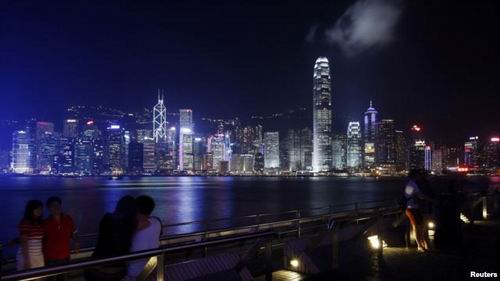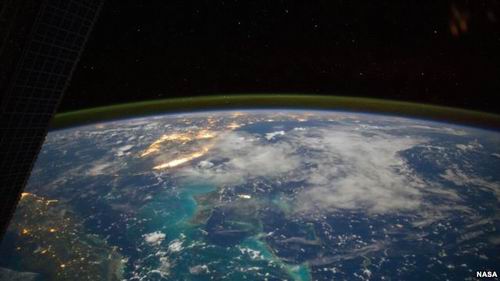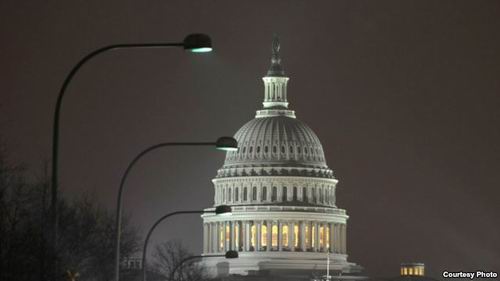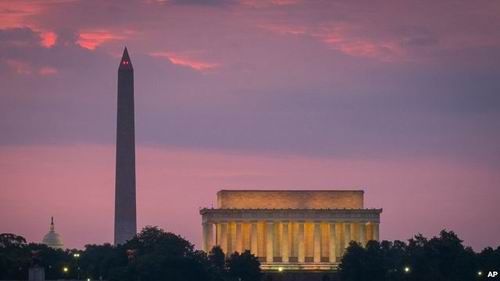参考译文
Light Pollution. How Much Light is Too Much?
 |
|
FILE - A study by the University of Hong Kong finds that Hong Kong, seen here in a 2013 file photo, has one of the worst light-pollution problems among cities around the world. (REUTERS/Bobby Yip ) |
Everyone who loves looking up at the night sky knows one thing: to see the most stars ... get away from a city.
每个夜晚喜欢抬头看天空的人都知道:在城市里,大多数的星星已经看不到了。
In cities, artificial light comes from street lamps, buildings, signs and cars. All this unnatural, man-made light blocks out any chance to see the stars.
城市中,到处都是街道的灯光、建筑物的灯光以及汽车灯光。所有这些人为造出来灯光阻碍了人们观赏星星。
In Washington, D.C. a man named Jim Dougherty is fighting for darker skies. He and others want to turn down the lights in the city and not just to improve stargazing. They believe a darker night sky is good for the health of people and our planet.
华盛顿特区一位名叫吉姆·多尔蒂的人努力为更黑的夜空争取。他和别人希望能够关掉夜晚城市里的灯,不仅仅为了能够眺望星星。他们认为更黑的夜晚对人体健康和我们的星球有益处。
What does Earth look like from space?
从太空中看,地球是个什么样子的?
The Earth appears to shine from space. What astronauts see as they circle the planet are the lights from our cities. This light creates a kind of orange cloud or haze that keeps us from seeing the stars.
从太空看,地球闪闪发光。宇航员绕地球转时看到的就是城市的灯光。这些灯光会产生一种橘色的云或者一种薄雾让我们无法看到星星。
Jim Dougherty is president of the International Dark Sky Association. He says the orange haze is light pollution.
吉姆·多尔蒂是国际黑暗夜空协会的主席,他说这种橘色的薄雾就是光污染。
"Light pollution is outdoor lighting that's not serving the task that it's designed for. In fact it is either wasted or, worse, has harmful, adverse effects."
“光污染就是室外的光,当初设计室外的灯是为了照明。实际上太多的灯光有点浪费,甚至有一些负面影响。”
Jim Dougherty says too much light is bad for your health. Studies find too much light disturbs our sleep, affects hormones and is linked to some cancers. He says light pollution is also bad for the planet.
吉姆·多尔蒂说太多的灯光对健康有害。研究表明太多的灯光打扰我们的睡眠,影响激素,甚至会跟某些癌症有关联。他说光污染对我们的地球也有害。
"There's a direct connection between the needless and harmful lighting and the excess generation. And it's also a big climate issue. We're worried about climate change. We're (are) just putting carbon dioxide up there. If we are burning natural gas or we're burning coal, we're causing global warming by sending light straight up into the sky."
“这些不必要又有害的光跟过度产生的光污染有直接的关系。这也是个气候问题。我们担心气候的变化,释放太多的二氧化碳,如果我们继续燃烧天然气或者煤炭,那就会把光直接传送到天空,从而导致全球气候变暖。”
Light pollution versus public safety
光污染对公众安全影响
But how much light is too much?
有多少灯才算是很多?
Mr. Dougherty went to a popular Washington neighborhood called Capitol Hill. In this area, round or globe-shaped street lights shine in all directions. He says too much light is being produced. But some people who live on Capitol Hill disagree.
多尔蒂去华盛顿特区附近一个非常受欢迎的地方——国会山。这片区域,各个方向都有圆形的街灯闪耀。这片地区产生太多的光污染,但是一些住在国会山的人并不赞同。
VOA reporter Rosanne Skirble spoke with two people out for a casual, evening walk.
美国之音的记者罗珊·斯凯博采访了两位晚上偶尔出来散步的人。
"It makes me feel safe, and I definitely feel like I can see all around me. I know no one is going to, like, hurt me or anything like that. It's just comforting."
“这些灯光让我感到安全,我可以看到身边所有的事物。我知道不会有人伤害我,或发生伤害的案件,我感到很安心。”
"The area around here is nice. It's populated. So the lighting is a good amount. It's not too bright and it's just the right setting for a romantic mood."
“这附近的地方都很漂亮,居住着很多人,所以灯光也很多。这里不是非常的明亮,不过很有浪漫的气氛。”
Jim Dougherty says he understands that Washington city officials want to make the sidewalks safe. But he says the city set up two times the number of street lamps than were necessary. And he says the lights are not designed well. They send light into the sky, where it is not needed. He says the street lamps are more for looks than safety.
吉姆·多尔蒂说他理解华盛顿市的官员想要让人行道安全。但是他说城市街灯的数量超过所需的两倍。而且灯设计的也不好,这些等直接将光线传到空中——不需要灯光的地方。这些街灯更多的是为了观赏而不是出于安全的考虑。
"The fact is the right amount of light is the right amount of light, and if you double it then you do not increase the public safety benefit, but you do increase the cost. You increase the energy use. You increase the climate impacts and the health effects. So, this is a classic example of over-lighting."
“实际上只要灯适量,数目足够就可以;如果让灯的数量加倍,不会增加公众的安全利益,而是会增加成本。此外,还增加了能源的使用,对气候影响和对健康的影响都在增加。这就是过度使用灯光的一个典型的例子。”
On their visit to the Capitol Hill, he and reporter Rosanne Skirble go to the grounds of a large apartment building. The grounds are lit by a combination of traditional lights that brighten, or illuminate, the grounds and walls. There are also more modern lamps that send light downward in one place where it is needed.
去国会山的参观中,他和记者罗珊·斯凯博去一些大型公寓楼的空地参观。地面上、墙上各种传统的灯饰照明,而且还有更多现代的灯将灯光打到需要的地方。
In the recent past, the Capitol Hill neighborhood had its share of crime. It still has reports of robbery, home break-ins and murder.
过去一段时间,国会山附近有很多犯罪案件发生,现在还有抢劫、入室盗窃和谋杀案的发生。
Ways to light our cities without causing light pollution
照亮我们的城市而不会造成光污染
There are signs of new lighting on the wide streets near the United States Capitol building. Jim Dougherty says that soon streetlights will not be necessary. But he says efficient lighting for sidewalks provide safety without wasting energy or causing light pollution.
美国国会大厦附近宽阔的街道上有很多新的照明标志。吉姆·多尔蒂说很快街灯就不再需要了,但是他说人行道有效的照明还是会为路人提供安全,并不会浪费能源或者导致光污染。
"Pretty soon in streets now we are not going to need streetlights because car headlights have become so bright. They are so effective. We use illuminated systems, paint stripe markers and reflectors. So, we really don't need street lights. But we will need sidewalk lighting. They are lower. They are dimmer. They are more efficient, and they get the job done without wasting all that money and all that energy."
“很快在大街上,我们不再需要街灯,因为车前灯很明亮,效果很好。我们使用照明系统,尤其条纹标志和反光板。这样就没必要使用街灯。但是人行道必须亮着灯。人行道的灯更低一点,更昏暗,而且更有效用,它们能够充分发挥作用不会白白浪费钱和能源。”
With knowledge comes action, he says. He explains that city officials are taking steps to stop wasteful spending and protect public health.
随着行动越来越科学,他解释说城市的官员正采取行动停止不必要的花费,保护公众健康。
"In some communities, they are adopting new technologies that they dim the lights, after say 1 a.m., when people don't really need it. So that's an important way to save. There are also developing technologies now when you step into a park or when you drive your car down a street, the lights come on because they have motion sensors. Or they sense your cell phone. They come on when there is someone there and then they turn off."
“在一些社区,他们采取新技术可以在凌晨一点后人们不太需要的时候,让灯光黯淡下来。因此这是节省能源和花费的一个重要的方式。他们现在还在研发新技术,当你走进公园或者驾驶车辆在路上时,灯光就会亮,因为这些灯有运动传感器;或者能够感应到你的手机。有人经过的时候灯就会亮,然后就会熄灭。”
A motion sensor turns lights on or off by detecting motion. Motion sensors can reduce lighting by 90 percent and still be effective. Mr. Dougherty hopes more communities use energy-saving devices like this. He says he hopes that in the future, we humans can reclaim the night sky.
运动传感器能够检测到运动的物体,让后亮灯或者灭灯。运动传感器可以减少90%的灯光,从而更有效利用能源。多尔蒂希望更多的社区使用节省能源装备。他表示希望在未来,人类能够重新看到夜晚的天空。
I'm Anna Matteo.
我是安娜·马特奥。
What is the night sky like where you live? Are you lucky enough to see the stars? Or do you live in a city that has lots of light pollution? Let us know in the comments section.
你居住的地方夜晚的天空是什么样子的?你能够看到天上的星星吗?还是你住的城市里有很多光污染?请在评论部分告诉我们。
"Blackout City" is a film from Nicholas Buer. The film shows what the night sky would look like without light in London.
《灯火熄灭后的城市》("Blackout City")是尼古拉斯·布尔的一部影片,电影展示的事伦敦没有灯光后的夜空是什么样子的。
Rosanne Skirble reported this story from Washington, D.C. Anna Matteo wrote it for VOA Learning English. George Grow was the editor.
______________________________________________________________
Words in this Story
artificial – adj. not natural or real; made, produced, or done to seem like something natural
stargazing – n. the act of looking at or studying the stars
globe – n. a round object
illuminate – v. to supply (something) with light; to shine light on (something)
haze – n. dust, smoke, or mist that has filled the air so that you cannot see clearly
disturb – v. to upset the natural and especially the ecological balance or relations of something
reclaim – v. to get back (something that was lost or taken away)
听力原文
Light Pollution. How Much Light is Too Much?
 |
|
FILE - A study by the University of Hong Kong finds that Hong Kong, seen here in a 2013 file photo, has one of the worst light-pollution problems among cities around the world. (REUTERS/Bobby Yip ) |
Everyone who loves looking up at the night sky knows one thing: to see the most stars ... get away from a city.
In cities, artificial light comes from street lamps, buildings, signs and cars. All this unnatural, man-made light blocks out any chance to see the stars.
In Washington, D.C. a man named Jim Dougherty is fighting for darker skies. He and others want to turn down the lights in the city and not just to improve stargazing. They believe a darker night sky is good for the health of people and our planet.
What does Earth look like from space?
 |
|
A view of Earth from the International Space Station flying above the Caribbean Sea in the early morning hours of July 15, 2014. (NASA astronaut Reid Wiseman photographer) |
The Earth appears to shine from space. What astronauts see as they circle the planet are the lights from our cities. This light creates a kind of orange cloud or haze that keeps us from seeing the stars.
Jim Dougherty is president of the International Dark Sky Association. He says the orange haze is light pollution.
"Light pollution is outdoor lighting that's not serving the task that it's designed for. In fact it is either wasted or, worse, has harmful, adverse effects."
Jim Dougherty says too much light is bad for your health. Studies find too much light disturbs our sleep, affects hormones and is linked to some cancers. He says light pollution is also bad for the planet.
"There's a direct connection between the needless and harmful lighting and the excess generation. And it's also a big climate issue. We're worried about climate change. We're (are) just putting carbon dioxide up there. If we are burning natural gas or we're burning coal, we're causing global warming by sending light straight up into the sky."
Light pollution versus public safety
But how much light is too much?
Mr. Dougherty went to a popular Washington neighborhood called Capitol Hill. In this area, round or globe-shaped street lights shine in all directions. He says too much light is being produced. But some people who live on Capitol Hill disagree.
VOA reporter Rosanne Skirble spoke with two people out for a casual, evening walk.
"It makes me feel safe, and I definitely feel like I can see all around me. I know no one is going to, like, hurt me or anything like that. It's just comforting."
"The area around here is nice. It's populated. So the lighting is a good amount. It's not too bright and it's just the right setting for a romantic mood."
Jim Dougherty says he understands that Washington city officials want to make the sidewalks safe. But he says the city set up two times the number of street lamps than were necessary. And he says the lights are not designed well. They send light into the sky, where it is not needed. He says the street lamps are more for looks than safety.
 |
|
Street lamps in Capitol Hill area of Washington, D.C. |
"The fact is the right amount of light is the right amount of light, and if you double it then you do not increase the public safety benefit, but you do increase the cost. You increase the energy use. You increase the climate impacts and the health effects. So, this is a classic example of over-lighting."
On their visit to the Capitol Hill, he and reporter Rosanne Skirble go to the grounds of a large apartment building. The grounds are lit by a combination of traditional lights that brighten, or illuminate, the grounds and walls. There are also more modern lamps that send light downward in one place where it is needed.
In the recent past, the Capitol Hill neighborhood had its share of crime. It still has reports of robbery, home break-ins and murder.
Ways to light our cities without causing light pollution
There are signs of new lighting on the wide streets near the United States Capitol building. Jim Dougherty says that soon streetlights will not be necessary. But he says efficient lighting for sidewalks provide safety without wasting energy or causing light pollution.
"Pretty soon in streets now we are not going to need streetlights because car headlights have become so bright. They are so effective. We use illuminated systems, paint stripe markers and reflectors. So, we really don't need street lights. But we will need sidewalk lighting. They are lower. They are dimmer. They are more efficient, and they get the job done without wasting all that money and all that energy."
With knowledge comes action, he says. He explains that city officials are taking steps to stop wasteful spending and protect public health.
 |
|
Sunrise behind the Washington and Lincoln memorials. |
"In some communities, they are adopting new technologies that they dim the lights, after say 1 a.m., when people don't really need it. So that's an important way to save. There are also developing technologies now when you step into a park or when you drive your car down a street, the lights come on because they have motion sensors. Or they sense your cell phone. They come on when there is someone there and then they turn off."
A motion sensor turns lights on or off by detecting motion. Motion sensors can reduce lighting by 90 percent and still be effective. Mr. Dougherty hopes more communities use energy-saving devices like this. He says he hopes that in the future, we humans can reclaim the night sky.
I'm Anna Matteo.
What is the night sky like where you live? Are you lucky enough to see the stars? Or do you live in a city that has lots of light pollution? Let us know in the comments section.
"Blackout City" is a film from Nicholas Buer. The film shows what the night sky would look like without light in London.
Rosanne Skirble reported this story from Washington, D.C. Anna Matteo wrote it for VOA Learning English. George Grow was the editor.
______________________________________________________________
Words in this Story
artificial – adj. not natural or real; made, produced, or done to seem like something natural
stargazing – n. the act of looking at or studying the stars
globe – n. a round object
illuminate – v. to supply (something) with light; to shine light on (something)
haze – n. dust, smoke, or mist that has filled the air so that you cannot see clearly
disturb – v. to upset the natural and especially the ecological balance or relations of something
reclaim – v. to get back (something that was lost or taken away)







